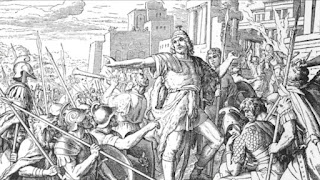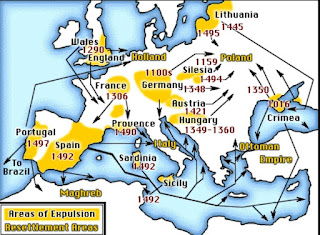It is a miracle that Jews have survived, let alone thrived. The modern State of Israel is truly a miracle. Our history has both strengthened us and it has also scarred us. 4000 years of traumatic events is encoded in our DNA.
Today, we are fighting a war on 7 fronts. United Nations around the world condemn us for taking our security into our own hands. No nation has tried harder to make peace. Still, they call us the aggressor. We are also in a public relations war around the world. And Jews are not safe anywhere.
People take for granted that they can just walk into their church, bank or store. That's not possible with virtually any synagogue around the world. They must all have high security with doors locked at all times. Nearly every holiday and every Jewish event requires armed police officers in-clothes and undercover professionals.
Add up the experience Jews have had over thousands of years and try to imagine how you would feel. I put together a list below to illustrate what Jews have faced historically, starting with ancient history. Here are major destructions and displacement of Jews prior to the Roman Wars:
Assyrian Conquest of Israel (8th Century BCE)
In 722 BCE, the Assyrian Empire conquered the northern Kingdom of Israel. Sennacherib (during his campaign against Judah) claimed to have destroyed 46 walled cities and countless small towns and villages.
The Assyrians deported large segments of the population, especially elites, leading to the “Ten Lost Tribes of Israel.” This event is considered the first major Jewish diaspora, though specific numbers are unknown.
Babylonian Exile (597–538 BCE) - The most significant pre-Roman destruction and displacement was the Babylonian Exile. After Babylon's conquest of the Kingdom of Judah:
- 597 BCE: First deportation after Nebuchadnezzar II besieged Jerusalem; thousands, including King Jehoiachin, his court, and skilled workers, were exiled to Babylon.
- 586 BCE: Jerusalem and Solomon’s Temple were destroyed; a second, larger deportation followed.
- 582 BCE: A third wave of deportations occurred.
The Babylonians were particularly interested in abducting the elite and skilled classes of Jews. Biblical Daniel was such a Jew.
The population of Judah was devastated—possibly reduced to 10% of its pre-war size, with famine, disease, and war compounding the destruction.
After the Persians came the Greek conquest of Israel when Alexander the Great annexed the region from Persian control in 332–331 BCE.
 |
| Judas Maccabeus (Judah Maccabee), known as "the Hammer," was a Jewish priest and military leader who led the Maccabean Revolt. |
In the 2nd century BCE, there was the Maccabean Revolt which lasted from 167-160 BCE where Jewish rebels, led by the Maccabees, successfully drove out the Seleucid Empire (Syrian-Greeks) and liberated Jews from the rule of Antiochus IV Epiphanes. After cleaning the desecration of the Second Temple, we celebrated the re-dedication of the Temple--this is the celebration of Hanukkah.
The Roman Wars:
Estimates indicate that between 800,000 and 1.3 million Jews were killed during the Jewish–Roman wars:
- First Jewish–Roman War (66–73 CE): Ancient sources estimate between 600,000 and 1,300,000 Jewish deaths, with over 100,000 killed or enslaved during the siege of Jerusalem alone.
- Kitos War (115–117 CE): Approximately 200,000 Jews killed.
- Bar Kokhba Revolt (132–136 CE): Ancient and modern estimates suggest about 580,000 Jews killed, with some sources citing even higher numbers; nearly 1,000 towns and villages were destroyed.
Major Expulsions of Jews Since the Roman Wars
Below is a chronological list of significant expulsions of Jews from various countries and regions, starting with the aftermath of the Jewish–Roman wars:
- 73 CE: Mass displacement and enslavement after the First Jewish–Roman War; Jews expelled from Jerusalem and much of Judea.
- 117 CE: Jews expelled from Cyrenaica, Cyprus, and large parts of Egypt after the Diaspora Revolt.
- 135 CE: After the Bar Kokhba revolt, Jews expelled from Jerusalem and central Judea.
- 415 CE: Jews expelled from Alexandria, Egypt.
- 418 CE: Jews expelled from Minorca.
- Medieval and Early Modern Europe
- 1290: England—Jews expelled by King Edward I.
- 1306: France—major expulsion under Philip IV.
- 1349, 1360: Hungary—Jews expelled twice.
- 1394: France—final expulsion until the 18th century.
- 1421: Austria—expulsion of Jews.
- 1492: Spain—Jews expelled under Ferdinand and Isabella.
- 1495: Lithuania—expulsion.
- 1497: Portugal—expulsion.
- 1499: Germany (Nuremberg)—expulsion.
- 1510: Naples—expulsion.
- 1514: Strasbourg—expulsion.
- 1519: Regensburg—expulsion.
- 1540: Naples—expulsion.
- 1542: Bohemia—expulsion.
- 1551: Bavaria—expulsion.
- 1569: Papal States—expulsion.
- 1597: Milan (Cremona, Pavia, Lodi)—expulsion.
Modern Era:
Russian Pogroms (1881–1921)Over two million Jews fled Russia between 1880 and 1920, due to both pogroms and expulsions
Beginning in 1881, waves of violent pogroms swept the Russian Empire, targeting Jewish communities with murder, destruction, and looting.
Pogroms were especially severe in 1881–1882, 1903–1906, and during the Russian Civil War (1917–1921), leading to thousands of deaths and the destruction of hundreds of communities.
In addition to violence, the Russian government enacted restrictive laws (like the May Laws of 1882) and expelled Jews from major cities such as Moscow, St. Petersburg, and Kharkov in the 1890s.
The Holocaust (1933–1945)
During the Holocaust, Nazi Germany and its collaborators systematically murdered six million Jews across Europe.
Jews were not "expelled" in the traditional sense but were forcibly deported to ghettos, concentration camps, and extermination camps, primarily for extermination rather than resettlement.
Thousands of Jewish communities—entire towns and villages—were completely eliminated throughout Europe during the Holocaust. Entire Jewish communities were destroyed across Germany, Poland, the Baltic States, Ukraine, Hungary, France, the Netherlands, and other occupied territories.
Centuries-old Jewish life was “obliterated” and only a small fragment of the prewar Jewish world remained. In Poland alone, nearly all of the 3 million prewar Jews and their communities disappeared.
Period Region/Country Nature of Expulsion/Violence Estimated Impact
- 1881–1921 Russian Empire Pogroms, city expulsions, legal restrictions 2+ million Jews fled
- 1933–1945 Nazi-occupied Europe Deportation to camps, genocide (Holocaust) 6 million Jews murdered
These periods mark some of the most devastating forced migrations and destructions of Jewish communities in modern history.
 |
| Yemeni Jewish emigrants, Aden, Yemen, 1949 |
20th Century Exodus: Expulsions of Jews from Muslim Countries
Between 1920 and 1970, about 900,000 to 1,000,000 Jews were expelled, fled, or forced to leave Muslim-majority countries across North Africa, the Middle East, and Iran. This mass exodus accelerated after the creation of Israel in 1948, often due to state-sanctioned discrimination, violence, and coordinated Arab League policies targeting Jews.
Notable Expulsions by Country:
Iraq: About 120,000 Jews left, especially after 1950, amid threats, bombings, and government pressure.
Egypt: Nearly all of Egypt’s 80,000 Jews left after 1948 and especially after the Suez Crisis (1956), following arrests, expulsions, and property confiscation.
Libya: Almost all 38,000 Jews left after anti-Jewish riots in 1945 and 1948, and expulsions in 1967.
Yemen: About 50,000 Jews left in 1949–50 during Operation Magic Carpet, following years of persecution and forced conversions.
Algeria, Morocco, Tunisia: Hundreds of thousands left between the 1950s and 1960s, often after independence and rising antisemitism.
Syria, Lebanon, Iran, Turkey: Jewish populations were reduced to a few hundred or less due to discrimination, violence, and legal restrictions.
The list above does not include the thousands of individual incidents of violence and anti-semitism. That list would not fit here and it is growing nearly every week to this day.
IT IS A MIRACLE JEWS ARE STILL HERE!!
NEVER AGAIN IS NOW!!
Israel is done running. We have no reason to trust the world or to put our faith in others. European leaders will not dictate our actions.
Israel is too small and modern weapons are too powerful to ever let our enemies reach our doors.
Given our history, you might think that Jews have been a pariah or some awful curse to the world. But the opposite is true. Jews have followed the laws of the land. We've pursued education and filled noble professional. We have a reputation for philanthropy.
Despite being .2% of the world population, Jews have made incredible and hugely disproportionate contributions to the world in all sorts of area including agricultural, literature, mathematics, medicine, music, philosophy, physics, science, theater and more.
Why 4000 years of Jew hatred? Jew hatred is illogical. We are hated by people who have never even met a Jews and by countries that don't even have Jews. The hate and persecution is so illogical. It has persisted for so long. It is a worldwide phenomenon.
There is even a Jewish date, the 9th day of Av (Tisha B'Av), dedicated to the many tragic events in Jewish history dating back to the destruction of the First Temple. There is a Jewish belief that Tisha B'Av relates back to the biblical "Sin of the Spies" during the Exodus, when everyone over 20 was not allowed to enter the Promised Land and was forced to die in the wilderness.
Maybe there is more to the Jewish story, the story that is in the bible, than we are seeing with our natural eyes. Maybe the strongholds we are battling are supernatural,
If all of this is biblical, we know where this heading. If that is the case, this story matters to each and every one of us. If this is biblical, then we all need to consider our relationship with God. Israel is done running! Are you?





















